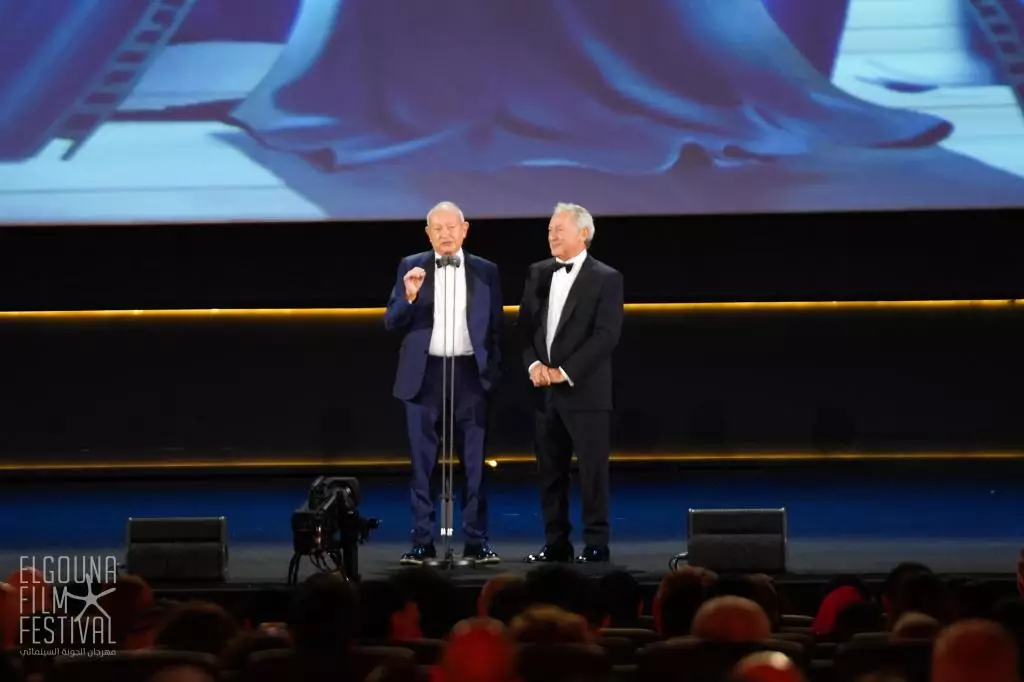The El Gouna Film Festival, which commenced on October 24, marked its return to its traditional autumn schedule after a brief postponement last year. This festival, taking place in the picturesque Red Sea resort of El Gouna, comes at a time of heightened anxiety and turmoil particularly surrounding the Israel-Hamas conflict. Such global and regional disturbances have influenced not only the festival’s atmosphere but also the screening selections, underlining the persistent intersection of art, politics, and censorship in Middle Eastern cinema.
A significant controversy overshadowed the opening of the festival when Abdelwahab Shawky’s short film “The Last Miracle,” which is imbued with themes related to Palestine, was abruptly removed from the lineup shortly before it was set to begin. Initially slated to kick off the festival, the film’s last-minute replacement by the Cannes Palme d’Or winner, “The Man Who Could Not Remain Silent” by Nebojša Slijepčević, drew considerable attention. The official statement from the festival citing an unspecified reason for the change only added to the speculation regarding censorship, a well-documented issue affecting artistic expression in Egypt.
Local media reports suggested that the Egyptian General Authority for Censorship had rescinded Shawky’s screening license just two days prior to the festival, raising questions about the nature of the government’s involvement in the arts. Tarek El Shennawi, a noted film critic, speculated that the film may have faced censorship due to its sensitive subject matter. Such incidents underscore an ongoing narrative of artistic restriction in the region and highlight the precarious position of filmmakers working within such constraints.
Shawky’s “The Last Miracle” draws inspiration from a short story penned by the late Naguib Mahfouz, a literary giant whose works often grapple with profound issues of identity, society, and the Arab experience. The film tells the story of a middle-aged man who embarks on a surreal spiritual journey following a phone call from a deceased Sheikh, delving into themes of loss and the search for meaning. Given that Mahfouz’s narrative emerged in the wake of the 1967 Six-Day War, which led to significant displacement of Palestinians, it can be argued that Shawky’s film is an exploration of the lingering effects of that conflict, resonating deeply in today’s socio-political climate.
In his comments regarding the film’s implications, Shawky highlighted a pervasive sense of hopelessness rooted in the continued aftermath of historical conflicts, pointing out how such sentiments influence contemporary narratives. The abrupt withdrawal of “The Last Miracle” from the film festival lineup illustrates the delicate balance filmmakers must navigate between expressing their artistic vision and adhering to state restrictions.
While El Gouna Film Festival typically exudes a glamorous vibe characterized by extravagant red carpets and celebratory parties, this year’s edition adopted a more subdued tone. The lavishness that has previously defined the festival was conspicuously absent, reflecting a broader cultural context of despair and urgency. Even with the presentation of 77 films from 32 countries, the overarching narrative remained focused on the calls for peace articulated by key figures, including festival founder Naguib Sawiris.
Sawiris’s opening remarks struck a poignant chord, encapsulating collective pain across regions suffering from conflict. His impassioned plea for an end to war resonated with attendees, acknowledging the global crisis and the profound role cinema can play as a medium for advocacy and healing. In discussing the current humanitarian crises, he highlighted that art and cinema have the potential to penetrate societal barriers, prompting reflection and, ultimately, change.
The El Gouna Film Festival serves as a critical convergence point for filmmakers, artists, and audiences, catalyzing discussions that transcend the mere exhibition of films. With the ongoing tension in Israel, Gaza, and Lebanon, the festival is more than just a cinematic showcase; it is a platform for dialogue, advocacy, and healing. It invites participants to engage with difficult questions about freedom of expression, representation, and the moral imperatives of art amid adversity.
In recognizing the precariousness surrounding artistic expression in Egypt, the recent events at the festival highlight a broader, urgent need for advocacy in the arts. By providing a space for films that address complex realities without fear of censorship, the festival embodies the spirit of resilience that characterizes creators and audiences alike in their quest for truth, understanding, and unity in the face of turmoil.
As the El Gouna Film Festival navigates these turbulent waters, it underscores the idea that while art can be subjected to censorship and oversight, it ultimately possesses the power to reflect societal truths and facilitate poignant conversations. With the world facing multifaceted crises, the festival serves as an essential reminder of the enduring value of storytelling and the role it plays in fostering empathy and understanding across cultural divides. As the festival unfolds, it stands as a beacon of hope, signaling a collective yearning for peace amidst profound challenges.
